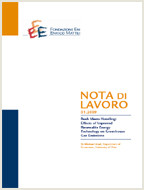Positive Freedom in Networked Capitalism: An Empirical Analysis

Data
01.09.2015
01.09.2015
Autori
Davide Carbonai (Universidade Federal do Rio Grande do Sul); Carlo Drago (University of Rome “Niccolò Cusano”)
Codice JEL
L4, P
L4, P
Parole chiave:
Social Network Analysis, Antitrust Policies, Interlocking Directorates, Europe, Positive Freedom, Negative Freedom
Social Network Analysis, Antitrust Policies, Interlocking Directorates, Europe, Positive Freedom, Negative Freedom
Publisher
Economy and Society
Economy and Society
Editor
Carlo Carraro (ad interim)
Carlo Carraro (ad interim)
The article proposes a social network analysis of the main European capitalisms and its correspondence with an index of economic freedom. The analysis relates to two kinds of economic liberties taken from the concept of freedom formulated by Isaiah Berlin. While the first kind of freedom (negative freedom) depends on the external system (e.g. the constraints on the firm defined by the regulations), the second refers to the internal obligations within the business system itself that prevent the free exercise of business (positive freedom): specifically, the social network, in which the company is embedded. After an operationalization of the two concepts of freedom, the analysis of a comprehensive database allows us to explore the relationship between the two kinds of freedom.
***
Suggested citation: Carbonai, D., C. Drago, (2015), ‘Positive Freedom in Networked Capitalism: An Empirical Analysis’, Nota di Lavoro 75.2015, Milan, Italy: Fondazione Eni Enrico Mattei.
